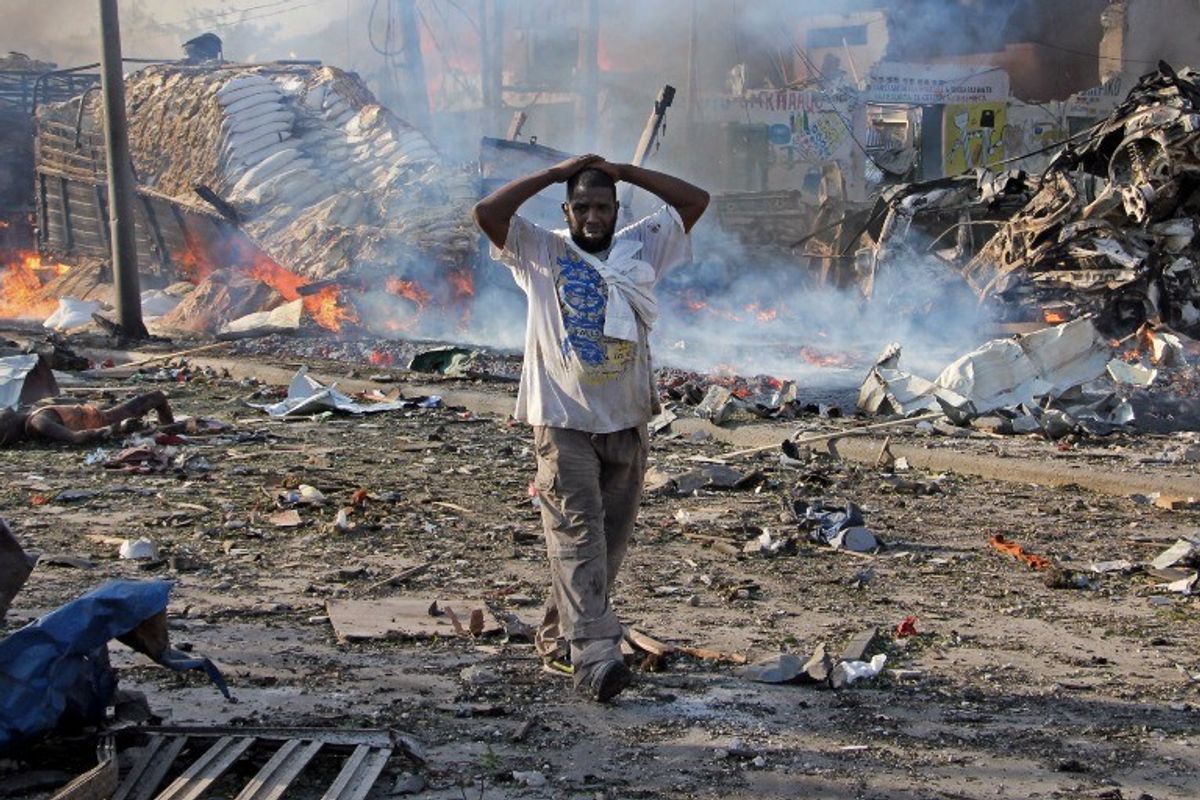Since Somalia’s independence in 1960, its relationship with the U.S. has been—for lack of a better metaphor—on a roller coaster that travels up and down dangerous steeps and performs sudden inversions that turn everything upside down. In other words, due to lack of formal and sustainable policy toward Somalia, the U.S. has contributed to creating the thrill-seekers’ paradise by setting aside diplomacy and soft engagement to chase terrorists. For the past decade or so, counterterrorism has been the name of the game, as both Somalia and the U.S. struggle to reshuffle their allies and redefine their strategic interests.
In 2006, in partnership with the most ruthless warlords in Somalia, the CIA funded a covert campaign that ultimately backfired on the George W. Bush Administration. In Operation Dung Beetle, the CIA commissioned cold-blooded warlords to help decapitate Islamic Courts—a coalition of clan-based “sharia courts” formed to fill the vacuum created by anarchy and provide semblance of law and order. This was followed by U.S. support for the Ethiopian invasion and occupation (2007-2009). In 2010, the U.S. then rolled out yet another self-defeating policy, known as dual-track.
This latter policy was seen as a rebranded version of Ethiopia’s “engage all actors on the ground” policy, even those engaged in a zero-sum campaign against the Somali government—so long as they are willing to fight al-Shabaab. These successive foreign policy fiascos have overshadowed the generous humanitarian assistance and security contribution that U.S. has been making.
Though it flies in the face of conventional wisdom, U.S. foreign policy toward Somalia is still fixated on counterterrorism and relies heavily on “militarized diplomacy” delivered by remote-controlled aerial bombers, which routinely create more enemies than the number of extremists they kill. With every periodical drone attacks, al-Shabaab gains priceless propaganda ammunitions and recruitment appeal.
Why Somalia Makes A Sound Investment
The importance of the Indian Ocean region cannot be underestimated. It is where global commerce, energy politics, extremism, natural resources, and geopolitical interests intersect. Across the Indian Ocean and the Red Sea, the Horn of Africa stands as “the new frontier for the world's energy industry,” because it is regarded within the oil and gas industry as having huge untapped potential. And Somalia, with its untapped oil, gas, uranium, other mineral resources, and protracted instability, is the microcosm of the region.
Somalia is in need of a strategic partner willing to pressure the neighboring tag-team that is holding her in a deadly headlock—Ethiopia and Kenya—to step aside; to weigh in and put economic pressure on key actors in order to engage in genuine, Somali-led reconciliation; and to help rebuild the national army and security apparatus that can keep al-Shabaab at bay.
Similarly, standing on geopolitical thin ice, the U.S. is desperate to maintain its presence in the Indian Ocean and the Horn of Africa. This is especially important now that China has outmaneuvered the U.S. in Djibouti, and the U.S. is losing its maritime strategic advantage or geopolitical edge, while being leveraged against the massive debt it owes to China.
Meanwhile, in addition to long-term natural resource contracts, China has completed major infrastructure related projects in various African countries—multibillion dollar projects of oil pipelines, railway connections, ports, etc. China’s ever-increasing investment in Africa is over $200 billion. On the other hand, both the U.S. and U.K. have their names associated with lords of instant gratification and exploitation. In order to place this critical relationship back on track, the process must be driven by a clear official policy of mutual interest implemented by the highest diplomatic office.
Prospect of Sustainable Stabilization
By default or design, the current stabilization model only perpetuates Somalia’s dependency on external actors and makes any attempt to reclaim state sovereignty mere political rhetoric.
Though it initially played a positive role, the African Union Mission in Somalia (AMISOM) has become a serious liability to the stabilization of Somalia and has severely undermined its sovereignty. Meanwhile, Ethiopia’s foreign policy toward Somalia is bearing fruits for Ethiopia. The Somali landscape remains littered with para-states that are perpetually hostile toward one another and are helplessly exposed to exploitation.
In the past decade, since the fall of the Islamic Courts and the subsequent foreign intervention, no serious attempt has been made to rebuild a competent, adequately equipped, and paid national army to neutralize al-Shabaab and restore law and order. The main contributing factors are a clan-based, dysfunctional government that talks about genuine reconciliation, but does nothing; and an international community that outsourced its mandate to Ethiopia and the latter’s exploitation of its fiduciary responsibility for zero-sum gain.
This is really where al-Shabaab, a profoundly despised movement, gets its fuel of support. The incompetence of successive clan-based governments failed to reconcile the nation, provide essential public services, and protect national assets, and they are heavily under Ethiopia’s command. Like other militant groups, al-Shabaab effectively exploits public disappointments and grievances, especially in remote towns and villages where the Somali government has merely a symbolic or no presence at all. The grievance that poses the most dangerous threat is the armed soldiers, whose salaries are squandered by corrupt officials and AMISOM bureaucracy. Against that back drop, it is hardly surprising to learn that a number of the Somali Armed Forces are situationally compelled to work for whomever will help them feed themselves and their families, whether it is private security companies, Ethiopia, or al-Shabaab.
By and large, the government is seen as a bunch of charlatans, who sold their souls and nation to Ethiopia, and the country’s natural resources for personal gain.
Change Is Near
In August 2016, the current government’s term ends and a new government is expected to be elected. For any new government to succeed, its leadership must possess the vision for a modern Somali state that does not grant political legitimacy to clans whose very nature is to promote exclusive rights and perpetual zero-sum strife against other clans. Political legitimacy comes from the people—individual citizens.
More importantly, the new leadership must have the will to transform the current dysfunctional political order by putting reconciliation on the top of its priority list. This, in turn, would become the foundation for a genuine constitution that enshrines citizenship rights and responsibilities, rather than the prevalent zero-sum clan rights. Without this, no new Somali government could claim national legitimacy or mandate. And without such legitimacy, any discourse or investment on security, good governance, and development would be an exercise in futility, at best.
Despite the generous praise that President Barack Obama offered Ethiopia during his visit, Ethiopia’s strategic interest in Somalia is on a collision course with that of the U.S. Ethiopia wants a divided Somalia along clan and sub-clan lines, and the U.S. wants to deal with an official state, and therefore wants to see a united Somalia.
Meanwhile, many Somalis perceive the Intergovernmental Authority for Development (IGAD), which micromanages security and political process in Somalia, as representing the interests of Ethiopia rather than Somalia. Under Ethiopia/IGAD de facto trusteeship, al-Shabaab expanded in number and became a more potent transnational threat, and Somalia became divided into a number of mini-states with half a dozen cardboard presidents who are hostile toward one another.
Clearly, the current arrangement must be wholly transformed for a safer Somalia to emerge, a sustainable U.S.-Somalia strategic partnership to materialize, and old oil exploration contracts to be reclaimed.











